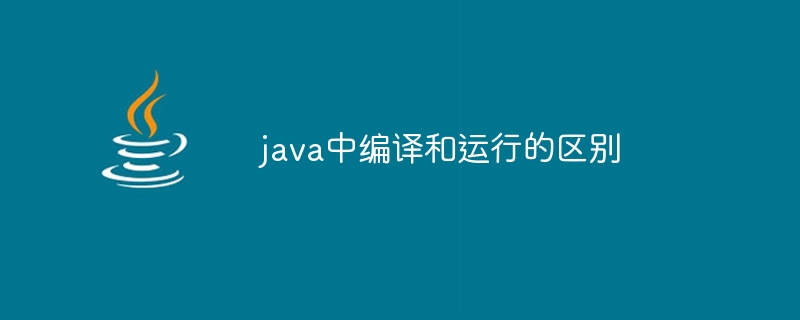The difference between compiling and running in java
Apr 25, 2024 pm 09:30 PMCompilation in Java converts source code into bytecode for syntax and logic checking and to increase execution speed. Runs on the JVM to execute bytecode, including class loading, instance creation, method execution, and error handling. The main differences include: time (compilation is executed first, running is performed dynamically), output (compilation into bytecode, running as the result), error checking (compiling to detect syntax, running to detect runtime errors), dependencies (compilation depends on the compiler, Runtime dependent on JVM) and flexibility (bytecode is executable across JVMs).

The difference between compilation and running in Java
In Java, compilation and running are two completely different things Process is crucial to understanding how Java works.
Compilation
Compilation is a process of converting Java source code (.java file) into bytecode (.class file). Bytecode is a machine-readable set of instructions that can be executed on a Java Virtual Machine (JVM). Compilation is typically performed by the Java compiler (javac).
The main purpose of compilation is:
- Check for syntax errors and logical errors in the code.
- Convert Java code to faster bytecode format.
- Ensure that the bytecode is compatible with the standards specified by the JVM.
Running
Running is the process of executing bytecode instructions on the JVM. The JVM is responsible for interpreting the bytecode and executing the behavior it represents. Runtime is typically performed by the Java Runtime Environment (JRE).
The main purpose of running is:
- Dynamic loading of classes.
- Create class instance.
- Execution methods and constructors.
- Handling exceptions and errors.
Differences
The key differences between compiling and running are as follows:
- Time: Compile Usually executed once before the program is run, while execution occurs dynamically while the program is running.
- Output: Compilation produces bytecode files, and running produces actual behavior and results.
- Error checking: Compilation is mainly used to detect syntax errors, while running will detect runtime errors, such as null pointer exceptions.
- Dependencies: Compilation depends on the Java compiler, and running depends on the Java virtual machine.
- Flexibility: Bytecode can run on different JVMs, while Java code can only be compiled on a specific compiler version.
The above is the detailed content of The difference between compiling and running in java. For more information, please follow other related articles on the PHP Chinese website!

Hot Article

Hot tools Tags

Hot Article

Hot Article Tags

Notepad++7.3.1
Easy-to-use and free code editor

SublimeText3 Chinese version
Chinese version, very easy to use

Zend Studio 13.0.1
Powerful PHP integrated development environment

Dreamweaver CS6
Visual web development tools

SublimeText3 Mac version
God-level code editing software (SublimeText3)

Hot Topics
 Top 4 JavaScript Frameworks in 2025: React, Angular, Vue, Svelte
Mar 07, 2025 pm 06:09 PM
Top 4 JavaScript Frameworks in 2025: React, Angular, Vue, Svelte
Mar 07, 2025 pm 06:09 PM
Top 4 JavaScript Frameworks in 2025: React, Angular, Vue, Svelte
 How does Java's classloading mechanism work, including different classloaders and their delegation models?
Mar 17, 2025 pm 05:35 PM
How does Java's classloading mechanism work, including different classloaders and their delegation models?
Mar 17, 2025 pm 05:35 PM
How does Java's classloading mechanism work, including different classloaders and their delegation models?
 How do I use Maven or Gradle for advanced Java project management, build automation, and dependency resolution?
Mar 17, 2025 pm 05:46 PM
How do I use Maven or Gradle for advanced Java project management, build automation, and dependency resolution?
Mar 17, 2025 pm 05:46 PM
How do I use Maven or Gradle for advanced Java project management, build automation, and dependency resolution?
 Node.js 20: Key Performance Boosts and New Features
Mar 07, 2025 pm 06:12 PM
Node.js 20: Key Performance Boosts and New Features
Mar 07, 2025 pm 06:12 PM
Node.js 20: Key Performance Boosts and New Features
 Iceberg: The Future of Data Lake Tables
Mar 07, 2025 pm 06:31 PM
Iceberg: The Future of Data Lake Tables
Mar 07, 2025 pm 06:31 PM
Iceberg: The Future of Data Lake Tables
 How can I implement functional programming techniques in Java?
Mar 11, 2025 pm 05:51 PM
How can I implement functional programming techniques in Java?
Mar 11, 2025 pm 05:51 PM
How can I implement functional programming techniques in Java?
 How can I use JPA (Java Persistence API) for object-relational mapping with advanced features like caching and lazy loading?
Mar 17, 2025 pm 05:43 PM
How can I use JPA (Java Persistence API) for object-relational mapping with advanced features like caching and lazy loading?
Mar 17, 2025 pm 05:43 PM
How can I use JPA (Java Persistence API) for object-relational mapping with advanced features like caching and lazy loading?
 How do I implement multi-level caching in Java applications using libraries like Caffeine or Guava Cache?
Mar 17, 2025 pm 05:44 PM
How do I implement multi-level caching in Java applications using libraries like Caffeine or Guava Cache?
Mar 17, 2025 pm 05:44 PM
How do I implement multi-level caching in Java applications using libraries like Caffeine or Guava Cache?







